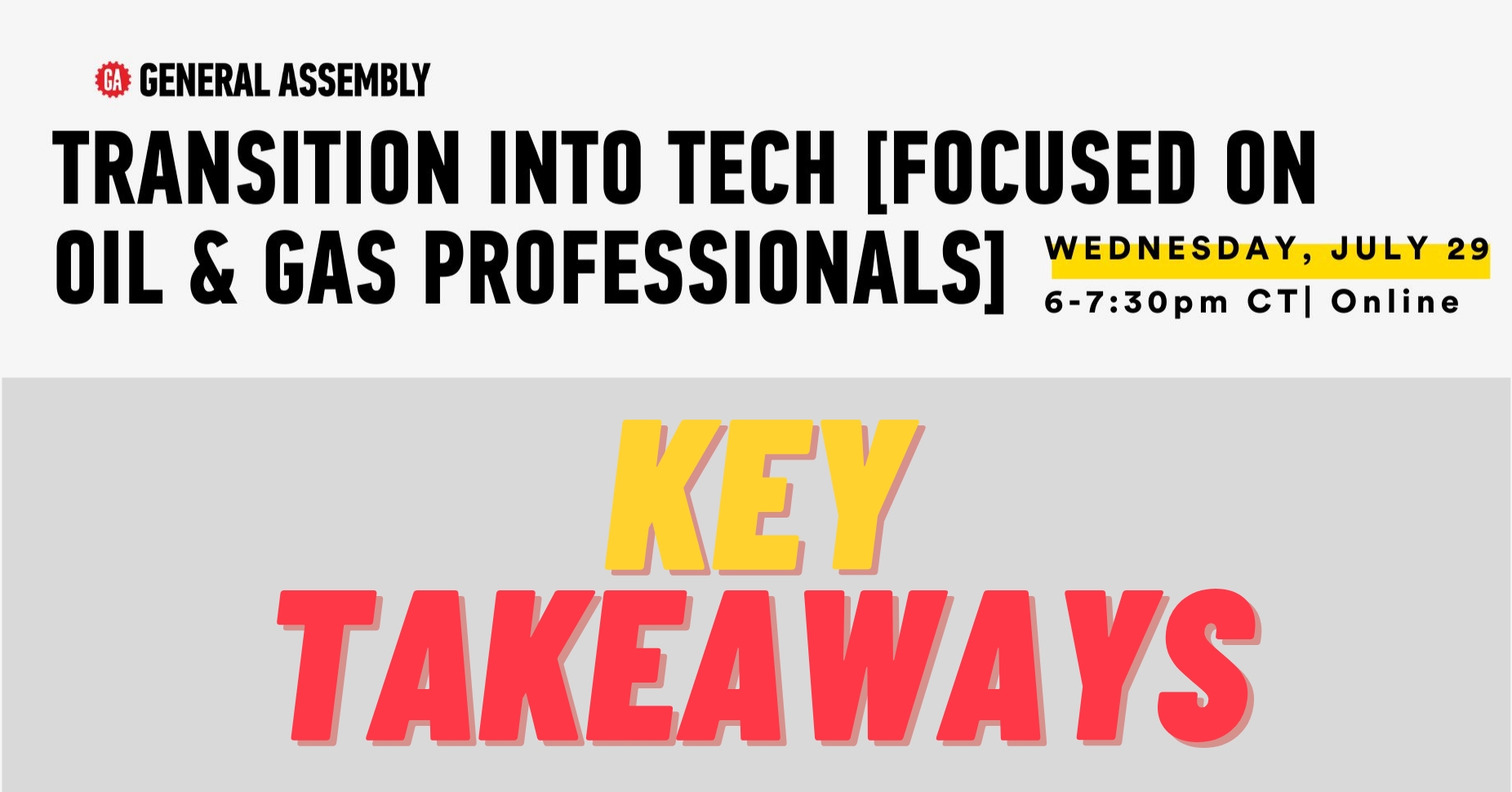Embracing Tech as an O&G Professional
(MY) key takeaways from the General Assembly-sponsored webinar discussing the transitioning of Oil & Gas professionals to a more tech-centric job role.

It’s now a few weeks out from when the webinar was held on July 29th 2020, and since then I’ve had ample time to reflect on the opinions presented as well as to conduct follow-up discussions with some of the panelists.
Let me first start by saying that contemplating a new direction in one’s career, or even a career change altogether, is scary. I should know, I’ve been doing exactly this for the past several months. Much of the discussion presented in this webinar focused not just on how technology is changing the Oil & Gas industry, but also on how members of the industry might embrace this change in order to offer value beyond what may typically be found at current O&G organizations.
Secondly, I must mention the opinions presented in this article are no one else’s but my own. These are my key takeaways, which have been informed by my research, this webinar, discussions with industry experts, and other various sources of information.
This webinar was hosted by a private, for-profit education organization known as General Assembly, also referred to as “GA.” Here is a quick excerpt about who they are, taken directly from their website:
General Assembly is a pioneer in education and career transformation, specializing in today’s most in-demand skills. The leading source for training, staffing, and career transitions, we foster a flourishing community of professionals pursuing careers they love.
Source: https://generalassemb.ly/
The panelists in attendance represented two major operators, a global oilfield services company, and an IT company providing innovative solutions to the energy industry. I’ve left out their names and respective organizations, as I wanted the points below to stand on their own merit.
So now that we’ve gotten the requisite background information out of the way, what are these “key takeaways?”
- Upskill, Upskill, Upskill. This was a common theme throughout all of the panelists’ responses. It is important to take time away from one’s busy professional life to ensure that one’s skills remain up-to-date. Here are just a few examples of how one might "upskill" themselves: obtaining a traditional university degree or certificate, attending an online course or bootcamp, reading an industry-recognized book, consuming YouTube videos, etc. Not only does upskilling improve your relevance to the industry but it also shows you have a commitment to learning and improving yourself. Having a digital skillset will help you to standout from the crowd of job applicants.
- Don’t operate under the myth that your good works will speak for themselves. Speak up for yourself and accept credit when it is earned. You are your own best advocate, particularly when organizations are going through such drastic changes like what we have seen recently surrounding the events of COVID-19.
- The current OPEX-driven environment has created a great need for people who can provide technology-driven improvements. For example, think “how can I reduce the cost of operation with automation, machine learning, data analytics, etc," and also "how can I show future hiring managers that I am the one to do it?"
- There are plenty of new opportunities to bridge the IT-side and the business-side of an organization together using the fields of data science and software engineering.
- Mentorship: All panelists were adamant about the need to have a diverse network of mentors with whom you have an authentic and natural relationship with! Easier said than done, but my personal 2 cents is that LinkedIN and local SPE networking events can be a great place to start!
- This last takeaway came as a result of a direct question I posed to the panelists:
Do the chances of finding employment markedly improve with completion of a bootcamp such as those offered by General Assembly?
Although the panelists noted the word "markedly" was difficult to prove or say for certain, they did affirm that attending a boot camp improves chances of employment “without a doubt.” The reasoning given for this is that a bootcamp demonstrates your interest in a particular subject or field, gives you a working vocabulary, and at the very least provides keywords for a resume. Additionally, many bootcamps are great about providing students with projects to help fill out their portfolio. Again, this goes back to demonstrating your proficiency, not just proclaiming it. This is where a personal GITHUB repository will come in handy.
These were my top 6 takeaways from the discussion. For those who were in attendance or were able to watch the recorded event after the fact, continue the discussion in the comment section below. What information or advice did you find most insightful?
Panelists' suggested resources:
(Yes, the word “unprecedented” was used at least twice during the event.)